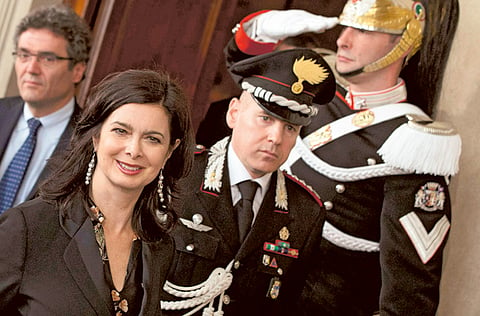Italy’s Napolitano hosts talks to form government
Met with the leaders of all the main parties in parliament

Rome: Italian President Giorgio Napolitano on Tuesday held a round of consultations with political leaders following his re-election in a new bid to end a two-month deadlock on forming a government.
The 87-year-old Napolitano met with the leaders of all the main parties in parliament and could announce his nominee for prime minister as soon as Tuesday afternoon or on Wednesday, observers said.
The president will make his announcement “within a few hours”, Pino Pisicchio, head of the mixed parliamentary group in parliament told reporters after meeting the head of state in Rome.
Napolitano is thought to favour a grand coalition arrangement including the leftist Democratic Party and the rightist People of Freedom party led by scandal-tainted former premier Silvio Berlusconi.
But the small “Left, Ecology and Liberty” (SEL) party, which has been allied with the Democratic Party, said it would oppose such an arrangement — as did the right-wing “Brothers of Italy” party.
“We are totally against the birth of a grand coalition government,” SEL leader Nichi Vendola said, adding that any cabinet that included Berlusconi loyalists would be unacceptable.
“The centre-right has destroyed Italy,” he said.
At his swearing-in ceremony in parliament on Monday, Napolitano told the parties he had been reluctant to stay on as president and accused them of being “deaf” to the urgent need for reforms.
He also threatened to resign if party leaders continued their “fatal stalling” on the formation of a new government - a drastic move that would plunge Italy into unprecedented instability.
The trickiest meeting will be at 1630 GMT with leaders of the Democratic Party (PD), which has been badly divided since it came first in February elections but failed to win a parliamentary majority.
The entire leadership of the leftist party stepped down on Friday after two of the presidential candidates it had proposed failed to win enough votes from the party’s own lawmakers in parliament.
One favourite to lead the party is Matteo Renzi, the 38-year-old mayor of Florence, a reformer inspired by the examples of US President Barack Obama and former British prime minister Tony Blair.
Analysts said the president’s prime ministerial nomination could come on Wednesday and the most likely choice would be former prime minister Giuliano Amato, a politically neutral Europhile.
Some analysts say Renzi himself is also a possibility, as is the current Interior Minister Anna Maria Cancellieri, a former prefect who would be Italy’s first female prime minister.
“The next government will be the president’s in all ways. We will have to see if the PD accepts this scenario without falling apart,” said Stefano Folli, columnist for Il Sole 24 Ore daily.
Italy, the eurozone’s third largest economy, has been in limbo since February’s inconclusive general election and Prime Minister Mario Monti’s outgoing government has limped on with only interim powers.
Business leaders, trade unionists and the Catholic Church have urged politicians to act quickly as a painful recession forces firms to shut down and leaves many Italians struggling to make ends meet.
The financial markets responded well to Napolitano’s re-election, with stocks in Milan rising by 1.66 percent on Monday and borrowing costs falling to their lowest level since 2010.
The markets were more cautious on Tuesday and the benchmark FTSE Mib index inched up just 0.41 in morning trading ahead of an expected imminent resolution of the long delay on forming a cabinet.
Giorgio Squinzi, leader of the main employers’ association Confindustria, says Italy has already lost 1.0 percentage point in gross domestic product due to the political stalemate.
The main centre-left coalition won a razor-thin victory over Silvio Berlusconi’s centre-right in the general election, with a new anti-establishment party that drew many protest votes not far behind in third place.
The Five Star Movement, led by ex-comedian Beppe Grillo, won votes with anti-austerity rhetoric and a condemnation of the perks and corruption that have plagued Italian politics for decades.


